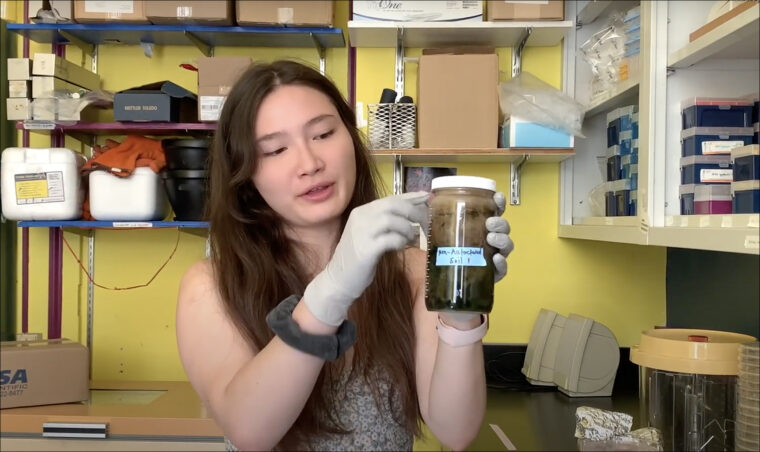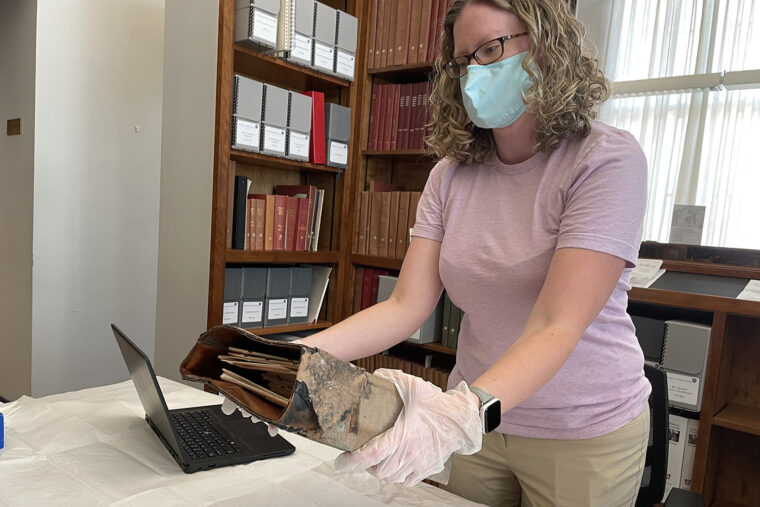A team of researchers at Wesleyan has discovered new strains of bacteria—located on the University's campus—that may have the ability to break down microplastics and aid in the world's ongoing plastic waste crisis. Microplastics, which measure less than .20 of an inch, enter the ecosystem— and our bodies— largely through the abrasion of larger plastic pieces dumped into the environment. According to a study published in the Journal of Environmental Science and Technology, the average person consumes at least 50,000 particles of microplastic a year and inhales a similar quantity. "Plastic is typically classified as a non-biodegradable substance. However, some…
At the age of 16, Reginald Dwayne Betts was arrested for armed carjacking. He was sentenced to prison—where an unknown person slid a copy of Dudley Randall's The Black Poets under his cell door. It was this book that sparked a love for poetry and led to his lifelong interest in literature. "I spent nine years, writing every day, reading every day, imagining that words would give me the freedom to sort of understand what got me in prison," Betts said. "And when you're trapped in the cell—literally— words are your only lifeline. And I committed myself to using them…
Like every other part of the campus community, Wesleyan’s student activity organizations are learning to adapt to the realities of the pandemic. The biggest change for many of those groups is a simple one—having the ability to get back together again. Hundreds of students attended the university’s annual Student Involvement Fair (view photos) in early September, and the excitement was, understandably, quite high. Wesleyan’s wide array of activities are always an opportunity for students to expand their intellectual and cultural horizons. For many, stuck in a pandemic stasis for almost two years, the Involvement Fair is a chance to interact…
As a newly-selected non-resident adjunct fellow for the Washington Research Consortium on Korea, Joan Cho hopes to showcase South Korea’s democratization through a new scholarly book tentatively titled, Dictator’s Modernity Dilemma: Development and Democracy in South Korea, 1961-1987. Cho, assistant professor of East Asian Studies, will participate in the multi-year laboratory research project until 2024 through the Center for Strategic and International Studies (CSIS). The project, titled “The South Korean Pathway: Understanding the Theoretical and Policy Significance of Korean Democracy and Foreign Policy,” will conduct an in-depth analysis of South Korea’s democracy and foreign policy to fill an important gap in…
In 1789, Congress ordered the printing and distribution of 600 bound copies of the Acts of Congress that contained the founding documents of the Constitution and the establishment of the Union. Of those books, only three remain today, and one is George Washington's personal copy. This rare volume, which was bequeathed to Washington's nephews in 1799, was exchanged and sold to several collectors for 165 years until it was acquired by former Wesleyan Trustee Richard Dietrich, Jr. '60, P'92— who established the Dietrich American Foundation in 1963. "This is the most important book that my father ever had," said Dietrich's…
The ongoing demolition of the 1954 wing of the Public Affairs Center (PAC) yielded a touch of history on Sept. 17 when crews unearthed a time capsule sealed into the concrete entry slab on the east side of the building. A demolition contractor found a partially damaged copper box that had been encased in concrete. The outside of the box was green and brown with oxidation and dirt, but the inside retained its original bright sheen and color. This particular contractor had seen time capsules on other building projects and knew what he was dealing with. (more…)
Jeremy Zwelling Assistant Professor of Jewish Studies and Assistant Professor of Religion Yaniv Feller penned an article over the summer titled “Too Good to be True?” for the Tel Aviv Review of Books. In the piece, Feller discusses the Museum of the Jewish People (ANU), which first opened March 2021. One of the museum’s main exhibits begins with a segment called “Mosaic: Identity and Culture in Our Times” before moving into the historical roots of Judaism, exploring different forms of Judaism in contemporary and historical contexts, as well as the diversity of the Jewish people and the way they observe…
Professor of Biology Sonia Sultan recently co-authored an article titled “Transgenerational effects of parent plant competition on offspring development in contrasting conditions” with BA/MA student Robin Waterman ’20. The article, published in Ecology on Sept. 8, examines the relationship between parent plants and their offspring, especially how competition among such parent plants can alter the next generation. “Conditions during a parent’s lifetime can induce phenotypic changes in offspring, providing a potentially important source of variation in natural populations. Yet to date, biotic factors have seldom been tested as sources of transgenerational effects in plants,” reads an excerpt from the paper’s…
Professor of Religion Mary-Jane Rubenstein recently co-authored an essay in collection titled Image: Three Inquiries in Technology and Imagination alongside Mark C. Taylor ’68, professor of religion at Columbia University. The book, published in September 2021 by the University of Chicago Press, explores how visual elements function in relationship to humans and technology. “Modern life is steeped in images, image-making, and attempts to control the world through vision,” the book’s description reads. “Mastery of images has been advanced by technologies that expand and reshape vision and enable us to create, store, transmit, and display images. The three essays in Image,…
Unspun wool. Silver-spray painted stones. A worn leather suit. Sketches from an iPad. A video of children studying. Each object offers its own narrative. Set again the viewers’ assumptions and impressions, a whole new set of meanings are created. A new art exhibition titled "The Language in Common," curated by Benjamin Chaffee, associate director of visual arts, attempts to offer more questions than answers. The exhibition, featuring installation, sculpture, video, sound, drawing, poetry and performance, brings together five international and intergenerational artists, including Cecilia Vicuña, Tanya Lukin Linklater, Julien Creuzet, Jasper Marsalis, and Alice Notley. It opened to the public…
Wesleyan’s intellectually dynamic faculty, students, alumni, staff, and parents frequently serve as expert sources for national media. Others are noted for recent achievements and accolades. A sampling of recent media hits is below: Kari Weil, University Professor of Letters, authors a commentary titled "How to read your dog's mind" in Salon. "For the early 20th-century biologist/ethologist Jacob von Uexküll, the fact that all animals (humans included) have the capacity to be affected by things in their particular environment or world and to respond to them, is evidence that they (like humans) are subjects of their worlds and not merely objects…
Barbecue-smoked pork paninis, apple cider-brined turkey legs, clam fritters with fresh pickle aioli, and blue hubbard squash bisque were among the lunchtime tastings offered to Wesleyan students on Sept. 21. As part of the 16th annual Eat Local Challenge themed "limited miles, unlimited flavors," Wesleyan's food service provider Bon Appétit staff was charged with crafting a meal from products and ingredients harvested within a 150-mile radius of the campus without sacrificing flavor. The meal included produce, meat, dessert, and drinks from local farmers and fishermen. "Back home, I often shop very locally and care a lot about where my food…









